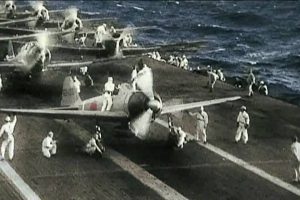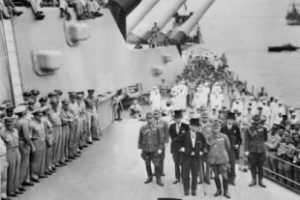Sanae Takaichi, a candidate for the LDP presidential election who is "doing well" despite being disliked by Washington for her excessive reverence for Yasukuni Shrine, is constantly pandering to the US power center. She is voicing her intention to drastically strengthen the country's defense, saying, "Japan is in the worst security environment surrounded by three nuclear powers: China, Russia, and North Korea," "There is no question of the need to strengthen Japan's defense," and "Russian and Chinese military aircraft are violating Japan's airspace because Japan is not taking them seriously enough." She is suggesting that in order to thoroughly block threats from the continent, from cyber attacks to airspace and waters violations, the party will fully cooperate with the US military industry, in other words, purchase a large amount of US-made weapons. Putting that aside, the Liberal Democratic Party, which was established in 1955 , was forced by the US Central Intelligence Agency (CIA) to merge two anti-communist conservative parties in order to prevent the establishment of a Socialist Party government . For this reason, naturally, no candidate for the presidential election is talking about the root cause of why Japan is currently in the worst security environment.
■ "The US is provoking China, Russia and North Korea" - A reversal of perspective is also necessary
Needless to say, the root cause is the existence of the Japan-US Security Treaty. For many years, the Japanese government and media have been propagandizing that the actions of China, Russia, and North Korea are hostile and provocative actions against Japan. This is a deception. The reason Washington established US military bases "all over Japan, whenever it wanted, wherever it wanted, and as many as it wanted" ( Secretary of State John Dulles) was not to have the US military protect the Japanese people. It was to use the Japanese archipelago as a base for invasion of the Eurasian mainland (Korea, China, Russia). Make no mistake. China, Russia, and North Korea are hostile not to Japan, but to the US military in Japan.
 According to the remarks of former US Ambassador to Japan Reischauer (pictured left) and LaRock's testimony, the "no introduction" principle of the three non-nuclear principles is meaningless, and US nuclear-equipped ships, including submarines, call at Yokosuka and Sasebo. It is suspected that storage of nuclear weapons at bay and land transportation are also commonplace. China, Russia, and North Korea are the targets of usable nuclear weapons of the US military stationed in Japan. Russia cannot return the Northern Territories to Japan, even if it is only two islands (Habomai and Shikotan), because it is concerned about the establishment of US military bases there. The US side is also trying to semi-permanently prevent the return of the two islands and the conclusion of a Japan-Russia peace treaty. It is no exaggeration to say that the military movements of China, Russia, and North Korea are the result of provocations by the US, South Korea, and Japan, with the US military in Japan at their core. At the very least, we need to consider this perspective.
According to the remarks of former US Ambassador to Japan Reischauer (pictured left) and LaRock's testimony, the "no introduction" principle of the three non-nuclear principles is meaningless, and US nuclear-equipped ships, including submarines, call at Yokosuka and Sasebo. It is suspected that storage of nuclear weapons at bay and land transportation are also commonplace. China, Russia, and North Korea are the targets of usable nuclear weapons of the US military stationed in Japan. Russia cannot return the Northern Territories to Japan, even if it is only two islands (Habomai and Shikotan), because it is concerned about the establishment of US military bases there. The US side is also trying to semi-permanently prevent the return of the two islands and the conclusion of a Japan-Russia peace treaty. It is no exaggeration to say that the military movements of China, Russia, and North Korea are the result of provocations by the US, South Korea, and Japan, with the US military in Japan at their core. At the very least, we need to consider this perspective.
■Learn from ASEAN: Taking a clear stance on neutrality
If I write this, the Japanese and American warmongers and their supporters will sneer at me as naive nonsense that has no understanding of "real politics." I will say it again. The only way for Japanese people to live safely and peacefully is to abolish the Japan-US Security Treaty. The Southeast Asia Treaty Organization (SEATO), which was established in 1954 after being caught up in the Cold War structure, was dissolved in 1977. The Association of Southeast Asian Nations (ASEAN), which was established in 1967, formed an economic community of 10 countries in the 1990s, modeled on the European Union.
Singapore Prime Minister Lee Hsien Loong Seng has made a clear stance of neutrality in Washington, saying, "Don't force us to choose between China and the United States." Japan needs to follow suit and fundamentally reconsider its security environment. In the 1990s, Malaysian Prime Minister Mahathir and others proposed an East Asia Economic Consultation with Japan at its core, excluding the United States and Europe, but these were all crushed by Washington. Southeast Asian countries had a major reevaluation of Japan after Prime Minister Murayama Tomiichi's 1995 speech in which he said, "We sincerely apologize for our aggression ." However, the Japanese, especially right-wing and conservative factions, still do not hesitate to call Asians natives. Their sometimes-used phrases such as "Hakko Ichiu" and "Greater East Asia Co-Prosperity" were long ago seen through as sophistry for colonial rule.
■ Pro-American cooperationists who sought subordination even before the war
What is evident from behind the US and British governments regarding the Ukraine War is Jewish capital and the Jewish lobby. Since the 19th century, their greatest enemy has been Russia, and their ultimate goal is to conquer the Eurasian continent. From the end of the Edo period to the Meiji Restoration, the Boshin War was followed by the advance into Korea and Taiwan, the Sino-Japanese War, and the Russo-Japanese War. Japan's Satsuma-Choshu clan government carried out these battles with the help of Jewish financial capital in the City of London through the issuance of huge foreign bonds. For the British Empire, Japan was a fortress for containing Russia in East Asia.
In the 20th century, after the Great Kanto Earthquake, Wall Street in the United States underwrote foreign loans to cover the costs of reconstruction. In this way, Japan, a late-developing imperialist nation, had been virtually subordinate to American and British financial capital, primarily of Jewish origin such as Rothschild , Morgan , and Rockefeller, even before the war. The dissolution of the Anglo-Japanese Alliance in 1923 was a red flag that the United States had begun to be thoroughly wary of Japan, and the military invasion of North China beyond Manchuria completely crossed the red line laid out by the United States and Britain. The imperial court network and zaibatsu surrounding Emperor Showa sought ways to cooperate with the United States and Britain in both military and economic interests and prevent the outbreak of war. This marked the birth of the pro-American faction, which led to the long-term administration of Yoshida Shigeru after the war and the formation of the Liberal Democratic Party.
■The surprise attack on Pearl Harbor was a decisive step towards expelling foreigners 100 years later.
However, the rise of military fascism rejected cooperation with Britain and the United States, and bound the people to a cult of the Emperor , which rejected the individualistic ideas of the United States and Britain, and placed loyalty to the Emperor and patriotism above all else, as seen in the True Meaning of the National Polity in 1937 and the Way of the Subject in 1941. The Japanese military's entry into the war against Britain and the United States was the work of madness. The war against Britain and the United States and the entry into World War II were the result of the slogans of "Opening the country to expel the barbarians" and "Conquering the barbarians with the barbarian's methods," which had been advocated by the grassroots of Satsuma and Choshu, who had turned from expelling the barbarians to opening the country, overthrown the shogunate, and established the new Meiji government, changing their slogans to "Devil America and Britain." In the first place, the "Japanese spirit, Western learning" of the Meiji period was a popular slogan that rejected the formation of a Western-style civil society and suggested the desire to form a restorationist monarchy where religion and politics were one and the same .
In the early Meiji period, when Saigo Takamori was asked "Why did you open the country to foreigners when you had preached so much about expelling foreigners ?", he is said to have replied, " Expelling foreigners is a ploy . The shogunate opened the country to the outside world, so I called for expelling foreigners in order to overthrow the shogunate. One day I will surpass the great powers and carry out real expulsion of foreigners." When Perry's fleet arrived off the coast of Uraga, Sakuma Shozan, who was in Edo, visited Yoshida Shoin, who told him, "(Once the nation becomes powerful) we will conquer the foreigners with the help of foreign methods," and " we will enrich the country and strengthen our military in order to expel foreigners ."
Therefore, the surprise attack on Pearl Harbor by the Japanese Navy on December 8, 1941 (photo, bottom left) can be said to be the "execution of the Great Expelling of Foreigners after about 100 years ," and the "Imperial Rescript on the Termination of the Greater East was a major setback in the expulsion of foreigners. The signing of the surrender to the United States on September 2 of the same year (photo, bottom right) paved the way for permanent defeat. The major task for the UK, which supported Satsuma and Choshu, was to use the Japanese Empire after the overthrow of the Tokugawa Shogunate as a bulwark against Russia. Therefore, the conclusion of the Japan-US Security Treaty in 1951 can be said to be the "colonization of Japan," at least in military terms, of the 100 years since the arrival of Perry, for the Anglo-Saxons of the US, Britain and the US . This colonization has now reached a point where there is no way out.


The key point for the US and UK in managing Japan after the war was not just to "ensure that Japan never again becomes a threat" but to "maintain perfect control over it while once again turning it into a powerful fortress facing Eurasia."
I will write it again. A frog frozen by a snake's glare. That's what I felt when I looked at the candidates for the LDP presidential election as well as the Constitutional Democratic Party leadership election.
